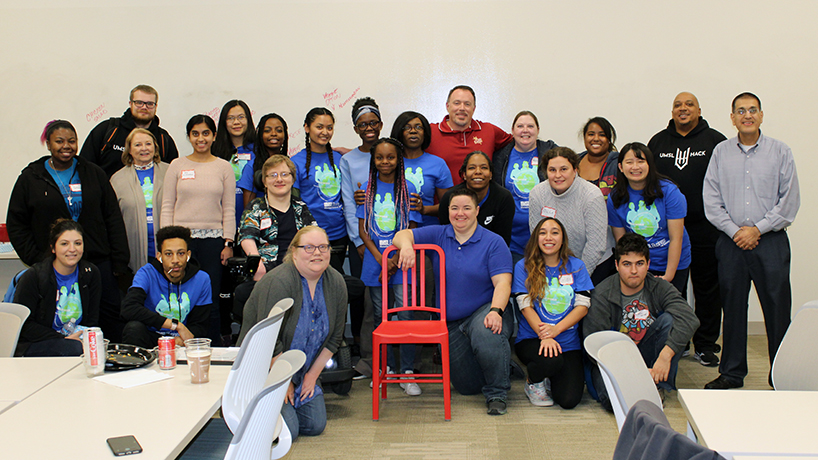
Teams of students, alumna and friends raced to solve problems related to the day’s theme, Women of Tech, during the daylong Women’s Hackathon on Nov. 2. (Photo courtesy of Nicole Gaehle and Rebecca Craine)
One of co-organizer Nicole Gaehle’s favorite parts of the Nov. 2 UMSL Women’s Hackathon was acknowledging all the participants with certificates and announcing their names. However, when it came time to call out the winners of the whole event, the University of Missouri–St. Louis student had the participants, mentors and judges beat out a drumroll and then she paused.
“The final winner is, and I know I’m going to say this wrong,” Gaehle said before a brief pause. “Team Balls?”
Gaehle’s announcement was met with a celebratory howl from one of the teammates, Alexius “Alexis” Gandy, which brought the humor of the moment to the next level and pleasantly shocked Gaehle.
“Team Balls,” which was actually Team Balss, was so named for the initials of its four participants: UMSL students Becky Lin, Gandy, Leilani Klein and Stephanie Webber and friend Skylar Mays. They created a game that taught coding to K-12 girls.
The second-place team was Code Breakers: alumna Sherie Richards, alumna Violeta Valle, Kleida Haxhaj and Nadia Sani. Third place went to Women Hack Connection: Tasha Washington, Kathleen Scott and Epharra Mendoza.
The groups’ projects all addressed the day’s theme, Women of Tech, and one of four problem statements: diversity in the workplace, healthcare industry, industry of choice or freestyle – either a combination of the others or an original problem.
The problem statement structure is standard for hackathons – day- or weekend-long events where participants work with a large data set to try to quickly address an issue. Women’s Hack took place over the course of a Saturday with check-in starting at 8 a.m. and judging beginning at 4:30 p.m.
This hack was founded by Brian Lawton, an Information Systems and Technology Department instructor, six years ago. After helping plan for the previous two years, Gaehle approached Lawton last year and asked if she could take it over. Shortly afterward, she recruited her roommate and UMSL College of Business Administration alumna Rebecca Craine to co-direct.
The two were inspired to take over after participating in previous years.
“A lot of people are afraid to go into a hackathon because they don’t know what they can actually do,” Gaehle said. “They think it’s all about coding, when it truly isn’t. A hackathon is actually good to have because then you can learn other tools that you’re not familiar with and also be able to network.”
Craine, who is a non-coder, and Gaehle, a coder, explained that non-coders might help generate ideas, be a project manager or mockup a product or website on PowerPoint. In order to emphasize the event’s universal appeal, they opened up participation to UMSL students of any major as well as to community members. They had five teams – each with four or five members – participate in addition to 20 mentors from companies such as Enterprise Holdings, Daugherty Business Solutions, Spry Digital, TD Ameritrade and Panera Bread as well as alumni.
Many of the same companies helped sponsor the event. Panera and Daugherty provided food while Spry and TD Ameritrade donated the prizes – $100 Amazon gift cards for the winning team, $50 for the second-place team members and $25 for third. The Department of Information Systems and Technology provided the room and space.
For the companies, participating in the program also served as an opportunity to witness potential employees in action. For the hackathoners, it was a chance to get hands-on experience.
“You kind of learn what you want to do in the IT industry,” Craine said. “The first year I participated, I just helped with building out the prototype that we actually showed in our presentation. The second year, I was actually the one that did the coding, and that told me that I didn’t want to be a coder.”
There were a few things that Craine and Gaehle changed up in their first year running the hackathon – a new icebreaker and adding more mentors who were women. They are looking forward to making more adjustments to next year’s program such as looking for sponsors earlier in the planning process.
One thing they were proud of was how smooth the planning went. Except for some last-minute food orders, they had no problems, and the feedback from participants was uniformly positive.
Those good experiences mean that the event is halfway to accomplishing its goals.
“My honest opinion is that it helps diversify the women in tech itself,” Gaehle said. “It’s about really wanting to support women getting into the IT workforce and wanting to help them be like, ‘Hey, we want to also support others getting into IT as well.’ There is a higher number of women students in the IT department now than there was 10 years ago. That’s great. That’s why this is here.”














